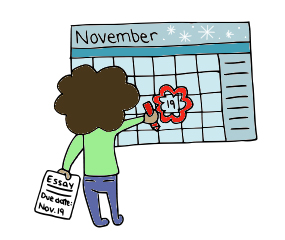59 The Starting Point
Now that you have a basic understanding of the writing process, what are the first steps when starting to write a paper? First step: read the assignment guidelines carefully. Second step: think about YOU in relation to the topic.
Step 1: Review assignment guidelines
- Highlight the key points when you read the guidelines and the marking rubric, if provided. You need to know what is expected of you before you start writing.
- Look for the verbs in the assignment and on the rubric. Are you being asked to reflect, analyze, argue, or something else? These verbs will help you determine what is expected and the type of writing that is required from you.
- Schedule the timing of when you will engage in each phase of the writing process. See Figure 6.2. Many factors will affect how long it will take you to write a paper: the length of the paper itself, the complexity of the ideas in the paper, the amount of research that is required before writing a paper, and all of your other competing obligations. For example, if you are expected to conduct a literature review, that will take you longer than writing a two-page reflection where you are only asked to incorporate one reference.

Figure 6.2: Scheduling your timing
Step 2: Think about YOU in relation to the topic
Before beginning the writing process, think about your positionality in relation to the topic. Positionality means how you position yourself in relation to a topic, informed by your identity. If you are writing about an experience, consider the emotions and feelings that have informed your thoughts about what has transpired. Every decision you make in writing (what you choose to write, how you describe the event, what you compare/contrast) conveys meaning. It is helpful to be aware of the meaning that underpins your writing so that you can be consistent and intentional in how you write. Early in your writing journey, you may be more comfortable with a more neutral or objective tone. As your writing evolves, you will become more skilled at integrating yourself into writing via tone, style, and delivery.
Student Tip
Time Management
Time management is important because you will have many nursing assignments. Start by writing the due date on your calendar, and then work backward from the due date to set aside blocks of time when you will work on the assignment. Always plan multiple writing sessions per assignment. Don’t try to move through all phases of the writing process in one evening: trying to work that fast is stressful and does not yield great results. You will plan better, think better, and write better if you space out the steps.
Activity: Check Your Understanding
Attribution statement
Content for this page was remixed with our original ideas and adapted (with editorial changes) from:
Writing for Success 1st Canadian Edition by Tara Horkoff is licensed under a Creative Commons Attribution-NonCommercial-ShareAlike 4.0 International License, except where otherwise noted. Download for free at: https://opentextbc.ca/writingforsuccess/
How you position yourself in relation to a topic, informed by your identity.

